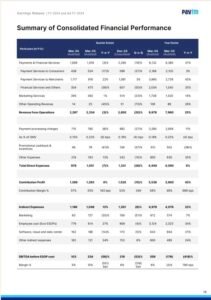One 97 Communications Ltd, the parent company of Paytm, has reported a significant increase in net loss for the fourth quarter of FY24, totaling ₹550 crore. This represents a 3.2-fold increase compared to a net loss of ₹169 crore in the same quarter of the previous year. The revenue from operations for Q4 FY24 stood at ₹2,267 crore, marking a 2.9% decline year-on-year from ₹2,334 crore in Q4 FY23. This quarterly performance was notably impacted by regulatory disruptions and a consequent decline in merchant activities.
Paytm FY24 Financial Highlights
- Total Revenue: ₹9,978 crore, up 25% year-on-year
- Contribution Profit: ₹5,538 crore, up 42% year-on-year
- Net Payment Margin: ₹2,955 crore, up 50% year-on-year
- Merchant Subscriptions: 1.07 crore as of March 2024, up by 39 lakh
- EBITDA before ESOP: ₹559 crore for FY24, marking the first full-year profitability on this metric since the IPO
Despite the quarterly setbacks, Paytm closed FY24 with a 25% year-on-year increase in revenue, reaching ₹9,978 crore. The company’s contribution profit surged by 42% to ₹5,538 crore, supported by a 50% increase in net payment margins to ₹2,955 crore. The gross merchandise value (GMV) for Q4 FY24 also grew by 30% year-on-year to ₹4.7 lakh crore. However, the payments revenue for Q4 was ₹1,568 crore, reflecting a 7% year-on-year growth but a 9% quarter-on-quarter decline due to the disruption of Paytm Payments Bank (PPBL) products.

The financial turmoil stems largely from the Reserve Bank of India’s (RBI) embargo on Paytm Payments Bank Ltd. (PPBL), implemented on January 31, 2024. This directive required PPBL to halt new credit and deposit operations, significantly affecting Paytm’s payment and financial services. “We have successfully transitioned our core payment business from PPBL to other partner banks, de-risking our business model and opening new opportunities for long-term monetization,” said Vijay Shekhar Sharma, Paytm’s CEO.
To mitigate some of the impact, Paytm reduced its marketing expenses by 16% quarter-on-quarter to ₹2,691 crore, maintaining a stable year-on-year level. The company’s employee costs saw an increase due to investments in technology and merchant sales teams, but reductions in other areas are expected to save ₹400-500 crore annually.
The lending business faced significant hurdles, with revenue from financial services and others declining by 36% year-on-year to ₹304 crore due to lower loan distribution. The total value of disbursed loans dropped sharply from ₹15,535 crore in the December quarter to ₹5,799 crore in Q4 FY24. Merchant loans contributed ₹1,671 crore, down 28% year-on-year, while personal loans accounted for ₹3,408 crore.
Looking forward, Paytm anticipates that Q1 FY25 will reflect the full financial impact of the disruptions experienced in Q4 FY24, with projected revenues between ₹1,500 crore to ₹1,600 crore. However, the company is optimistic about a recovery starting in Q2 FY25 as it resumes certain paused products and stabilizes its operating metrics.
“In FY25, our key focus will be on leveraging significant consumer opportunities in embedded insurance and wealth product distribution,” Sharma stated. The company has also become a Third-Party Application Provider (TPAP) with the National Payments Corporation of India (NPCI), partnering with major banks to ensure a smooth business transition.

Despite the current challenges, Paytm remains committed to its core payments business, focusing on recovering its consumer and merchant base, and driving monetization through financial services. The company’s strategy includes achieving significant cost efficiencies through AI-led capabilities and a leaner organizational structure, which are expected to drive sustainable growth and profitability in the upcoming fiscal year.












Comments 1